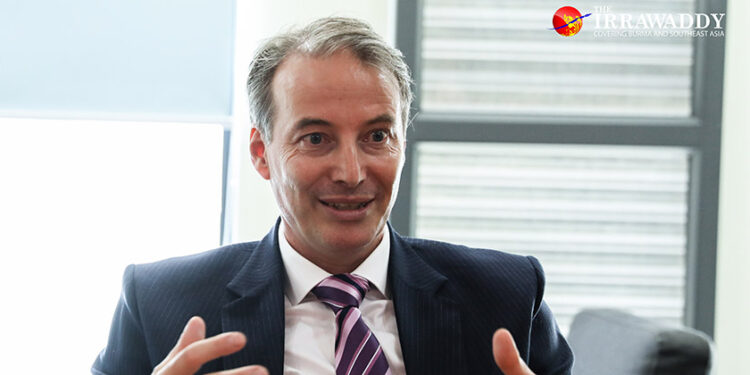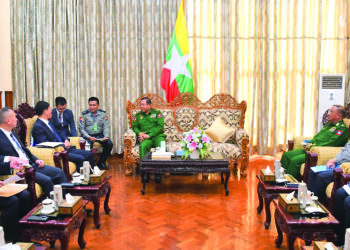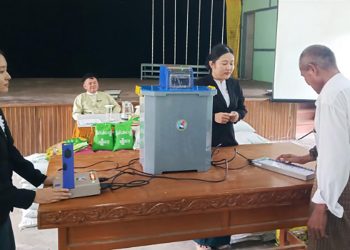Outgoing EU Ambassador to Myanmar Kristian Schmidt will soon return to the EU’s headquarters in Brussels after three years of service, but the EU Delegation to Myanmar plans to continue its strong partnership with the country, including providing support ranging from suspension of debt repayments to financial assistance for unemployed garment workers amid the COVID-19 outbreak, to national education reform and ethnic language instruction.
Recalling his fond memories of his time in Myanmar engaging with many people involved in the country’s democratic transition, Schmidt said living in the country had given him an “even greater understanding of what it means to fight for democracy.” In Myanmar, those who speak about democracy don’t speak theoretically, but “speak from actually making significant sacrifices,” he said. The outgoing ambassador added that he understood very well after three years that nation building in Myanmar is an ongoing process, and the West and Europe need to understand that not all of the country’s problems are linked to the Rohingya issue.
Ahead of his departure, he told The Irrawaddy that Myanmar has made progress in some areas, but still needs to work on a few others, as the country is “hungry for a better life, freedom and peace.”
The following are excerpts from Schmidt’s discussion with The Irrawaddy’s associate editor Nyein Nyein.
The Irrawaddy: In a recent statement [dated July 2] the EU, as part of Team Europe, pledged its support for Myanmar’s fight against COVID-19 by suspending debt payments. How will this help Myanmar?
Ambassador Schmidt: Well, dealing with this pandemic, I think the government has a number of urgent priorities. Of course, paying the salary and [for] the equipment of the nurses on the frontline, that is perhaps the number one, then to manage quarantine facilities and to support people who are out of a job, the returning migrant workers. All these are immediate priorities that require funding.
This happens when businesses are struggling. Therefore the government is giving tax breaks, deferring payments to the central budget. You can see these are increasing and the revenues are decreasing. Unless Myanmar receives support from its friends very quickly, I am worried that the Ministry of Finance will run out of cash liquidity.
The most important thing is to support the government in its capacity to act very fast. We’ve done [this] with our … support payments—so, payments that are going directly to treasuries. But now we’ve also done it with this debt deferral decision, which simply said, well, Myanmar was owing debt repayment to six European countries; they have decided that they can wait. These payments should wait and be delayed.
I will repeat the call that while this is 20 percent of what Myanmar was due to pay until the end of the year, I hope the other partners of Myanmar, who represent 80 percent, will do the same thing, because that is what a good friend does. You don’t expect your money back when your friend is struggling.
You have been in Myanmar for three years and witnessed a number of elections, including by-elections. Myanmar is due to hold a general election in November. What are your expectations for this?
In 2015, there were areas in Shan State where the security situation prevented elections. I think this year the situation in Rakhine is cause for great concern because if the people cannot vote, and feel they participate in decision-making, it increases the risk that they will see other means, including violent ones. Therefore, I really hope that it will be possible to vote in all areas of Myanmar.
Hopefully this campaign from the political parties will be about ideas and how to improve the lives of people in Myanmar. This will be about who has the best idea, the best plan for the economy, for democracy, for equality of the ethnic areas, and, you know, [that] everybody feels part of this country; who has the best idea for the peace process to deliver sustainable peace for Myanmar.
We have been invited to observe the election by the UEC [Union Election Commission], so I hope that there will be a very strong team of EU observers. Whoever wins, of course, we take no position on that; this is for the people of Myanmar to decide who to choose. But I sincerely hope that we will look back and say this was another step forward in Myanmar’s transition to democracy. If these elections are better, more peaceful than in 2015, and so on, you will go ahead with a strong mandate for the next government.
The EU also provides support for elections in Myanmar. What role will the EU play in the 2020 election, and what kind of support are you providing?
We have worked with the program called STEP Democracy, which works on voter education, supporting the Union Election Commission in carrying out its mandate, supporting the domestic observers. It is very important that there are foreign observers, but I also think that civil society has a strong role to play in observing elections here in Myanmar.
What is your main takeaway from your years in Myanmar?
Well, I spoke earlier about the courage that I have seen of people who are truly committed to democracy and a better life, but also understanding … peace. Peace is necessary. One of my most important takeaways is the work that still remains to be done. You know the 70 years of isolation; you cannot overcome that in just three years. Three years is nothing.
Dealing with the conflict in Kachin for instance, for the fundamental grievances that are in Rakhine State—whether it is the Rakhine ethnic community or whether it’s Rohingya—there are deep-rooted governance issues, of equality between the ethnic groups, of trust in government and in authorities, so building that trust, it takes much more than three years.
So I think the West and Europe for sure need to understand that the problems in Myanmar aren’t just linked to the Rohingya issue. However serious this is—for Europe it is very serious—but we also need to understand, I certainly understand it very well after three years, that nation building in Myanmar is an ongoing process.
In Rakhine, there are two separate issues—the Arakan Army and the Rohingya—but the West and the international community know only about the latter. What would be your message to them?
There is a reason why there is a strong focus in the West and in the UN on the Rohingya issue, because of what happened in 2017 and 2012. Not because I say so. Now I think we have the government agreeing after investigating—its own investigation—that crimes against human rights … grave human rights violations were committed. This is now I think accepted, as disproportionate forces were used by the Tatmadaw [Myanmar’s military] in addressing the attack by ARSA [the Arakan Rohingya Salvation Army] in 2017 and the violence that led to the forced expulsion of 700,000 people. This is a big international incident, and rightly so, at the center of attention.
Also because three years later they [Rohingya refugees] are still there, living in camps. I have been myself to the camps in Cox’s Bazar [in Bangladesh]. It is not the place you would want to go through the monsoon and COVID-19. I can tell you that for sure. There is the underlying issue of statelessness that remains a violation of human rights and would need to be addressed, to find a sustainable solution. There needs to be a more realistic path to citizenship for the Rohingya.
But as I also said, we, the West—certainly the EU—understands, my authority understands that the situation in Rakhine State goes beyond the issue of the Rohingya. We can see that with the fighting with the Arakan Army right now.
There is a desire on the side of the Rakhine community for a greater say in their own affairs. The Rakhine State parliament wishes to have a greater say in its own affairs. This is something that we also have in Europe, you know, the regional governments asking for a greater say, and you have to address those grievances by talking to agree.
If you are part of the Union like Rakhine State is, then you have to accept there are certain decisions that are taken by the Union government, by the Parliament in Naypyitaw. But we also see in the European Union, there is a constant discussion and decision about what decisions are not taken in the center, what decisions should be taken at the local level, closer to the people. And therefore you agree that issues like education, culture, health and other things are state competent in a federal Union.
So the answer to the problem not only in Rakhine State, but also in Kachin and Shan, and Wa [Self-Administered Zone], the answer to that is to write a new constitution with a federal setup that clarifies all of that. Fighting certainly will not get you there. Violence for sure will not get you there. So it is the work of writing that constitution that is the priority, in my view.
What role did you play in Myanmar’s peace-building process as EU ambassador during your term? And what more can the EU do in terms of peace building in Myanmar, given that the country is moving closer to China, and that China is already acting as a peace broker between the ethnic armed groups, the government and the Tatmadaw?
The government has been very clear that they accept support, but not facilitating or mediation from international actors. That goes for China as well. China is helpful occasionally at bringing people to the table or hosting venues.
But it is very clear that Myanmar is in control of its own peace process and nobody is facilitating or mediating between the government, the Tatmadaw and the ethnic armed groups. I think that is probably the wise choice; this peace process is probably one of the most complex peace processes in the world, because you have so many different actors around the table.
We are not facilitating or mediating or putting ourselves in the middle. But nobody is. This is a Myanmar-driven process. What we have been doing since the very start as a witness to the Nationwide Ceasefire Agreement [NCA] is to support the entire peace architecture, whether to the JMC [Joint Ceasefire Monitoring Committee], or various UPC [Union Peace Conferences] that are taking place. This, [via] the Joint Peace Fund, is being supported by the European Union.
I have myself kept very much in touch as much as possible both with the Peace Commission, but also very much with the ethnic armed organizations [EAOs], the signatories in particular. Because I think that it builds confidence and trust on the side of the EAOs that they can talk to the international community.
You know when they signed the NCA, one of the reasons why they did so was because they expected that the recognition and the ability to work also with the international community [would be] one of the benefits of signing the NCA. And that’s why I think it’s very important that we do not disappoint them, and I certainly [found] in all my talks to EAOs that they really appreciate talking to the international community, and we will continue to do so.
Do you think Myanmar’s current government is really able to implement the steps needed to improve the human rights situation? What areas does the government need to put more effort into, or focus on, to make Myanmar fully democratic?
My impression from talking to government ministers is often a feeling that they themselves would have wanted to do more. And I think that is the nature of any government. You come in with high hopes and aspirations and plans, and then reality happens. Unfortunately one of the cases that happened in Myanmar is the attack of ARSA in Rakhine State and then the violent reaction of the Tatmadaw. I think that has in many ways influenced the government. The government probably itself has the plans to [implement], and then Rakhine has been attracting a lot of attention.
I think there are areas of progress on human rights and democracy, the new child rights and some of the labor rights I see progressed, both on legislation and implementation. I am hoping very soon that the [prevention and protection of] violence against women law will pass in Parliament and will be a strong law, giving better protection to women.
Then there are a number of areas where I think progress could have been made… in particular the freedom of expression and protection of journalists. Some of the old laws that are now being used by individuals, not by government so much, but by individuals to intimidate journalists, including your own newspaper. Those laws, I would have thought, could have been addressed by the democratic government, with such a huge majority in Parliament. I think it is unfortunate that these laws, I am talking about Penal Code [Article] 505 and Telecommunications [Law Section] 66(d), that these laws were not amended in order to give freedom of expression a more solid basis in Myanmar. But I am hopeful that this is something that will be tackled in the coming years, because it is part of any democracy to protect freedom of expression.
The interview has been edited for length.
You may also like these stories:
Beijing’s Long Game: Where is China Headed in 2020?
WHO Country Chief Urges Myanmar to Sustain ‘Amazing’ COVID-19 Response

















